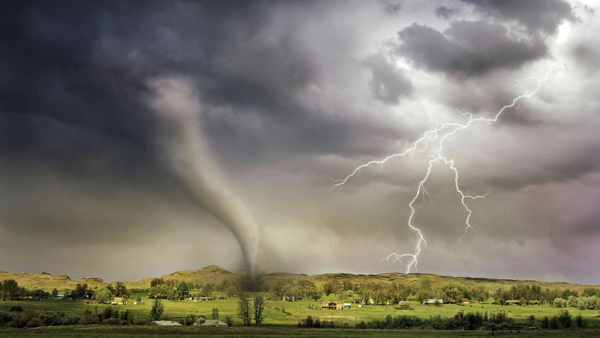Is there an investment vehicle that has some immunity against stock market volatility, produces steady returns over the long term, attracts the money of even the largest corporations, and improves the ecology of agricultural soil? Managers at Farmland LP think so.
This statistic might also surprise investors: With an estimated total market capitalization of $3.8 trillion and rising, according to industry sources, farmland matches the heft of the commercial office building market.
"Farmland has zero correlation with stocks," Craig Wichner, founder and managing partner of Farmland LP, told Investor's Business Daily in a one-on-one interview at the Milken Institute's annual global conference held in May at the Beverly Hilton Hotel. "The problem has been access to land for farming is very difficult (for investors)."
According to Wichner, Farmland LP has grown to become the nation's 14th largest farmland manager and the largest in organic and regenerative agriculture.
For wealthy individuals and families, the desire to diversify investments to avoid "concentration risk" rises as investable assets go up. And judging by the growth of Farmland LP, which is raising capital for its Fund III product with an end-goal of $250 million, that desire is strengthening. Farmland's Fund I and Fund II have already closed, with the former raising $61 million and the latter raising $135 million.
Farmland now has 57 wealth advisors that act as partners to raise capital. They include Fidelity Investments and Pershing.
Farmland Client: A Magnificent Seven Tech
Tom Sullivan, managing director at Farmland and a former investment banker at Credit Suisse (which was acquired by UBS) and Piper Jaffray (now known as Piper Sandler), notes Microsoft is the firm's largest institutional investor. The business software, gaming console and cloud computing titan became a key investor in September 2024. Sullivan noted that Fund III has closed $110 million in equity commitments and is targeting the year-end for hitting its ultimate goal of $250 million.
For Microsoft, one attraction is the ability to invest in farms as a form of carbon sequestration, a method of reducing carbon from the atmosphere. "They want to buy our carbon emission credits," Sullivan told IBD.
Sullivan points out the potential for growth among high net-worth investors is great, since "23% of institutional capital is in alternatives, and just 6% for individuals."
So, what makes a long-term private investment in a company such as Farmland LP more attractive than, say, deploying capital in publicly traded outfits such as Gladstone Land, a Nasdaq-listed real estate investment trust that went public in 2012 and holds an annualized dividend yield of just over 6%? Priced near 8.94, the small-cap REIT stock has fallen 79% from its April 2022 all-time peak of 42.10.
Farmland's executives point to a business model that has parallels with multi-tenant commercial real estate.
The Latest In Investor's Corner
Farmland Business Strategy
The Larkspur, Calif., firm's 55-person farm management team concentrates its efforts on making strategic purchases in the ballpark of $50 million to $100 million in Northern California, Oregon and Washington. Farmland practices a regenerative style of farm management. By ditching the centuries-old methods of row-crop agriculture, the firm says its practices lead to healthier soil and better economics on the farm.
The company's mission is to "increase revenue and profits per acre," said Wichner. The graduate of both University of California at Berkeley and UC San Diego spent summers on farms and majored in microbiology. Wichner argues that practicing sustainable, organic farming has become "more profitable than chemical-dependent crop agriculture."
Blueberries, cherries, wine grapes, apples, almonds, hazelnuts and herbs serve as examples of high-margin products. The firm's farms grow as many as four different products on the same land plot as opposed to mono-cropping. Currently, Harry & David, Driscoll's, Joel Gott Wines, Tillamook, Procter & Gamble, Colgate-Palmolive, Sprouts Farmers Market, Costco Wholesale and Amazon.com-owned Whole Foods Market count among Farmland's customers.
"We are value-added agricultural land managers," Wichner said. "For value-added agriculture, you need hubs for regenerative organic products."
Within Fund III, the company has acquired 4,800 acres. Sullivan added that some of the land is also used for row crops, but with organic products exclusively.
"In our acquisitions, we have achieved geographic and crop diversity," Sullivan said. "The environment to acquire farms today is the most favorable we have seen in years. We are looking to fully deploy our Fund III (assets) by 2026."
The Returns
So, what sort of long-term returns should investors expect?
The team refers prospective investors to the Chicago-based NCREIF Farmland Index. This quarterly index uses a "time series composite return" approach to measure investment performance by a large pool of individual farms. According to the benchmark, farmland has generated an average annual return of 10.5%. It also shows "bond-like volatility," Wichner said. Why? One reason might be that the farmland has low leverage. Industry experts peg a 13% LTV (loan-to-value) ratio for the sector. This leads to a smaller impact from big sell-offs in debt markets.
During the Great Financial Crisis of 2008 to 2009, the S&P 500 plunged nearly 58% from a peak of 1,576.09 back in November 2007 to a March 2009 low of 666.79. Even defensive stocks such as utilities fell 50% off their highs, the NCREIF index showed nary a significant drop.
"Farmland is essentially commercial real estate. Forty percent of farmland is leased," Sullivan said.
Regarding taxes, Sullivan added that most accredited investors receive a 1099-dividend tax form only in the years when the firm provides a distribution.
A Multi-Generational Connection To The Land
Consider also the emotional aspect of investing in land that grows food. During marketing events and investor meetings, Sullivan said he often gets a positive, visceral reaction from investors who decide to join the Farmland family.
"They love it," he added. "I often hear investors say 'My dad was a farmer.' There is a real connection (to the investment) vs. hard assets like barges and parking garages."
Please follow Chung on X/Twitter: @saitochung and @IBD_DChung







